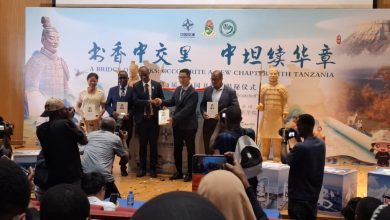‘EWURA is raising bar in energy regulations’

TANZANIA: THE Energy and Water Utility Regulatory Authority (EWURA) is now at the forefront of Tanzania’s energy revolution, setting tougher regulations and delivering higher service standards to match the country’s bold economic ambitions, Dr Doto Biteko, Deputy Prime Minister and Minister for Energy announced in Dodoma, recently.
Presenting the 2025/26 budget estimates for the Ministry and Office of the Deputy Prime Minister, Dr Biteko hailed EWURA as a “pillar of national transformation,” credited with ensuring that the country’s expanding energy needs are met with discipline, quality and a strong consumer focus.
“EWURA must ensure that regulation is not only reactive but forward-looking, enabling Tanzania’s transformation into an industrial and energy-secure nation,” Dr Biteko stressed, setting the tone for what he called “a new era of active regulation.”
Over the 2024/25 fiscal year, EWURA intensified its oversight operations significantly. The Authority licensed 68 new energy projects, ranging from natural gas distribution to renewable energy ventures.
It conducted 174 inspections of fuel depots, gas stations and power plants nationwide, uncovering safety violations that resulted in the closure of 28 non-compliant facilities.
“Regulation without enforcement is meaningless,” Dr Biteko insisted. He emphasised that a regulatory system only earns public trust when it acts decisively against risks and inefficiencies, especially in vital sectors like energy and water. The energy demands Tanzania is witnessing are nothing short of explosive.
Between March 2024 and April 2025 alone, national electricity demand surged by 20.84 per cent, reaching a peak load of 1,921.44 megawatts.
Meanwhile, the country’s generation capacity grew impressively to 4,031.71 megawatts, marking an astonishing 151.7 per cent increase from the 1,601.84 megawatts recorded just four years ago.
EWURA’s role in certifying new power sources, ensuring technical compliance and regulating tariffs was essential to managing this unprecedented growth.
Protecting consumers in a volatile market.
EWURA’s vigilance extended well beyond the producer side of the energy equation.
Dr Biteko noted that the Authority undertook a critical review of petroleum pricing, a move that helped stabilise domestic fuel costs during a period of extreme global volatility.
“While world markets were in turmoil, our citizens saw price increases remain within manageable levels— under 8 per cent year-onyear,” he said. The outcome, according to Dr Biteko, was a shield against inflationary pressure and an essential support to Tanzania’s economic stability.
In the water sector, too, EWURA was active.
Over the past year, the Authority issued 22 new operating licences to urban and rural water providers, a move that expanded access to regulated water services by 6.5 per cent across the country.
“Water and energy are the veins through which national development flows,” Dr Biteko observed.
“Without strong regulatory frameworks, these vital sectors would stagnate or serve only a few, instead of empowering millions.”
Nonetheless, Dr Biteko was quick to acknowledge the challenges facing EWURA.
Despite its many successes, the Authority faces significant structural hurdles. Limited technical capacity to manage the growing complexity of new energy technologies, combined with bureaucratic delays in enforcement actions, pose risks to regulatory effectiveness.
“We must grant EWURA and other authorities greater operational independence to act swiftly and professionally, without unnecessary bottlenecks,” Dr Biteko urged Parliamentarians. He warned that Tanzania’s energy revolution could be jeopardised if its regulatory engines are not adequately empowered.
The government’s response to these challenges was reflected in the 2025/26 budget allocation, which earmarked funds to strengthen EWURA’s operational capacity—a modest but symbolic 8 per cent increase compared to the previous financial year.
These funds will support a range of modernisation initiatives, including the full digitisation of licensing, compliance audits and consumer grievance handling systems by the end of 2025.
One of EWURA’s flagship initiatives for the coming year will be the introduction of performance-based licensing for electricity and water service providers.
Under the new system, providers will be evaluated annually based on service delivery metrics such as response times, service reliability and customer satisfaction. Licences will be renewed or revoked depending on performance.
“We are raising the bar for service delivery. Mediocrity will no longer be tolerated,” Dr Biteko announced emphatically.
In the petroleum sector, EWURA will tighten surveillance of the Bulk Procurement System for fuel imports, a mechanism crucial to ensuring competitive pricing and security of supply.
In 2024/25, EWURA supervised the procurement of billions of litres of petroleum products through this system, helping to stabilise the market. With rising global uncertainties, EWURA’s new mandate includes building up Strategic Petroleum Reserves and implementing real-time cargo tracking for petroleum tankers.
As Tanzania eyes a future of industrialisation and regional energy leadership, Biteko left no doubt about the central role regulators like EWURA must play.
ALSO READ: EWURA’s oversight enhances energy sector
“Energy and water are not luxuries,” he declared. “They are rights—and through institutions like EWURA, we are making those rights a reality, ensuring that every Tanzanian has access to quality, reliable and affordable services.”
“Regulation must evolve faster than the markets it oversees. EWURA must not follow change; it must lead it. Only then can we guarantee that the energy fuelling our economy is clean, fair and sustainable for generations to come,” he noted.





